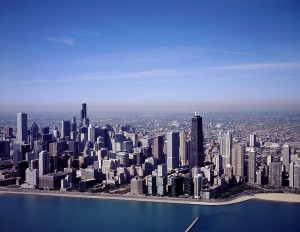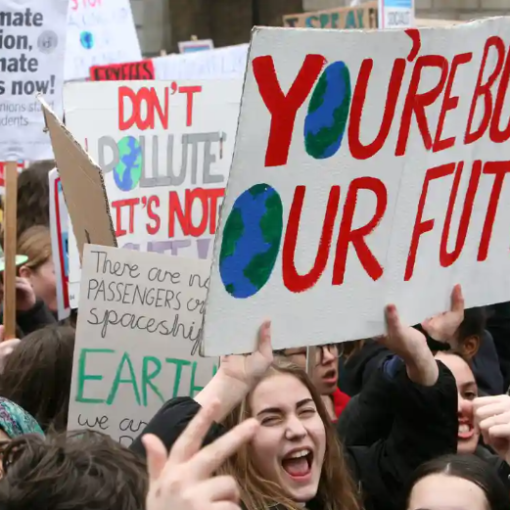By Hunter Book, Summer Legal Intern
 On June 3, 2013, a group of lawsuits that generated significant interest among environmental lawyers were abruptly withdrawn.[1] The cases notably alleged a novel theory of liability and duty of care regarding climate change projections. In Illinois Farmers Insurance Co. v. Metro Water Reclamation District of Greater Chicago[2](and related cases found here,[3] here,[4] here,[5] and here[6]), Farmers requested class certification to represent all property insurance companies, affected policyholders, and other affected property owners in connection with severe rains that hit the Chicago area on April 17, 2014. The suits alleged that the Reclamation District and Chicago-area governments breached their duty to store storm water safely and to remedy property damage from the resulting flood. Farmers alleged that the Defendants were responsible for flood damage caused by the overflowing storm basins. The Defendants allegedly determined the capacity needed to avoid floods with historical data that did not account for the effects of climate change. Since the climate change projections indicate greater rainfall than in the past, the Defendants had a duty to plan for the increase.
On June 3, 2013, a group of lawsuits that generated significant interest among environmental lawyers were abruptly withdrawn.[1] The cases notably alleged a novel theory of liability and duty of care regarding climate change projections. In Illinois Farmers Insurance Co. v. Metro Water Reclamation District of Greater Chicago[2](and related cases found here,[3] here,[4] here,[5] and here[6]), Farmers requested class certification to represent all property insurance companies, affected policyholders, and other affected property owners in connection with severe rains that hit the Chicago area on April 17, 2014. The suits alleged that the Reclamation District and Chicago-area governments breached their duty to store storm water safely and to remedy property damage from the resulting flood. Farmers alleged that the Defendants were responsible for flood damage caused by the overflowing storm basins. The Defendants allegedly determined the capacity needed to avoid floods with historical data that did not account for the effects of climate change. Since the climate change projections indicate greater rainfall than in the past, the Defendants had a duty to plan for the increase.
The central issue was whether the Defendants maintained their storm water basins, sewers, and drains unsafely.[7] Farmers noted that the Reclamation District published (and was clearly aware of) six watershed plans that “identified known storm water sewer … management defects.”[8] Moreover, Farmers claimed that the Defendants knew of the lack of capacity, as they revealed by pumping the reservoirs before heavy storms to reduce the water levels.[9] The basins required additional capacity due to increases in rainfall, allegedly associated with climate change. This increase overwhelmed the current infrastructure and rendered the old rainfall tables obsolete.[10] By adopting “the scientific principle that climate change has caused increases in rainfall,” the Plaintiffs insist that the Defendants acknowledged a causal link between climate change and heavier rainfall.[11] In short, the Defendants allegedly knew that the infrastructure was insufficient and failed to cure it. Thus, Farmers alleged a breach of the Defendant’s duty to the victims.
These cases are interesting in that they do not encounter the same causation issues present in much climate change litigation. Unlike claims that attempt to show causation between carbon emissions and the particular harm, Farmers proposes a modest theory of causation. Here, Farmers did not need to show that the Defendants’ actions caused climate change. Nor did it need to show that climate change itself caused the flooding, since the Defendants allegedly acknowledged the increasing rainfall.[12] Rather, they only proposed to show that, in view of the increasing rainfall, the Defendants’ unsafe maintenance of their infrastructure caused or contributed to the flooding. Since the connection between climate change and increasing rainfall was admitted, the only issue is whether improved infrastructure would have prevented the flooding. If so, the failure to provide those improvements establishes causation.
It is also interesting to consider why Farmers filed these complaints at all. Farmers’ attorneys surely knew that the cases would be an uphill battle, if only because of the Illinois Tort Immunity Act, which limits the tort liabilities of municipalities.[13] It is unknown now whether Farmers actually intended to pursue these cases or whether its intention was to cause a stir and put local governments on notice that they may face litigation if they do not adapt to climate change.
[1] Robert McCoppin, Insurance Company Drops Suits over Chicago-Area Flooding, Chi. Trib., June 3, 2014, https://www.chicagotribune.com/news/local/breaking/chi-chicago-flooding-insurance-lawsuit-20140603,0,6767298.story.
[2] Complaint, Ill. Farmers Ins. Co. v. Metro Water Reclamation Dist. of Greater Chi.,
https://common-resources.org/wp-content/uploads/2014/05/Chicago-Flood-Insurance-Suit-.pdf.
[3] Complaint, Ill. Farmers Ins. Co. v. Cnty. Of McHenry, https://www.arnoldporter.com/resources/documents/Ill%20Farmers%20Ins%20Co%20v%20Cnty%20of%20McHenry%20-%20complaint.pdf.
[4] Complaint, Ill. Farmers Ins. Co. v. Cnty. Of DuPage, https://www.arnoldporter.com/resources/documents/Ill%20Farmers%20Ins%20Co%20v%20Cnty%20of%20DuPage%20-%20complaint.pdf.
[5] Complaint, Ill. Farmers Ins. Co. v. Cnty. Of Lake, https://www.arnoldporter.com/resources/documents/Ill%20Farmers%20Ins%20Co%20v%20Cnty%20of%20Lake.pdf.
[6] Complaint, Ill. Farmers Ins. Co. v. Cnty. Of Will, https://www.arnoldporter.com/resources/documents/Ill%20Farmers%20Ins%20Co%20v%20Cnty%20of%20Will.pdf.
[7] Supra, note 2 at ¶27.
[8] Id. at ¶29.
[9] Id. at ¶46.
[10] Id. at ¶48.
[11] Id. at ¶49.
[12] “Heavy rains and snows could become more frequent in winter and spring. Increased intensity of downpours will make travel more dangerous, flood basements, pollute bodies of water, damage crops, stress the city’s infrastructure and disrupt transportation.” Chicago Climate Action Plan, 40, available at https://www.chicagoclimateaction.org/filebin/pdf/finalreport/CCAPREPORTFINALv2.pdf.
[13] See 745 ILCS10


